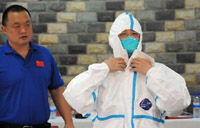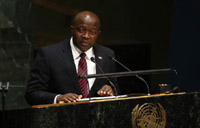US to toughen Ebola screening at airports
Updated: 2014-10-08 19:37
(Agencies)
|
||||||||
 |
| Chinese medics train Sierra Leone health workers |
 |
| US military to ramp up Ebola mission in Liberia |
| US hospitals unprepared to handle Ebola waste |
"We're working very intensively on the screening process both in the places of origin and upon arrival," Dr. Thomas Frieden, director of the Centers for Disease Control and Prevention, told reporters. "We will absolutely look at every step that could tighten that process."
The move would go beyond CDC efforts to augment screening for travelers leaving Ebola-stricken countries such as Liberia, which it has viewed as the best way to address the potential spread of the virus. But the diagnosis of the first Ebola patient on US soil last week has strengthened calls from lawmakers and some health experts to introduce stronger measures in this country.
Screening passengers upon arrival in the United States could detect passengers who may have developed a fever in flight but will also pose new challenges to border control officers and flight crews, industry experts said.
In August, CDC teams trained airport workers in West Africa to use handheld scanners that check travelers for fever, a possible sign of Ebola, and helped develop an exit questionnaire to determine potential exposure. Since then, some 36,000 people have boarded flights. Screening measures led 77 travelers to be prevented from boarding: 74 had a fever and three had other symptoms. Most turned out to have malaria and none had Ebola.
Frieden did not give details of what the CDC was considering. The new measures will likely include more thorough pre-screening and more detailed questioning of passengers leaving Sierra Leone, Guinea and Liberia, congressional aides said.
They may also involve checking such air travelers for fever, said US Senator Charles Schumer.
The US Coast Guard also announced it would screen individuals coming into the United States via ship from Ebola hot spots.
The Ebola outbreak, the worst on record, has killed at least 3,439 people out of 7,492 confirmed, probable and suspected cases since it emerged in March.
NEW PRESSURES FOR AIRLINES
US airlines have only said they are working with government health officials to ensure the safety of travelers. Industry experts said screening could pose a new burden to airline workers and airport officers, already under pressure to keep passengers moving.
"I can imagine (the airlines) asking a lot of questions as to why this is preferable than testing at the origin," said Robert Mann, an airline industry consultant.
The Association of Flight Attendants, a union representing nearly 60,000 flight attendants at 19 airlines, on Tuesday urged more extensive health screenings of passengers as they leave West Africa.
The American Civil Liberties Union is keeping an eye on the Obama administration's response but so far has not seen anything at airports that raises new issues about privacy, said Jay Stanley, an ACLU senior policy analyst.
But he warned against heavy-handed law enforcement tactics such as quarantines that restrict liberty and are less effective.
"The public health profession has learned a lot of lessons, and it's even more important at a time of fear that we pay close attention to what will be effective," Stanley said.
A 2008 ACLU report on responding to pandemics recommended that invasive medical examinations at the border take place only "when there is reasonable suspicion of pandemic disease, and only with the individual's informed consent." The report noted the government has wide authority to detain people at the border during a pandemic.
US Senator Chris Coons, chairman of the Senate Foreign Relations Committee's Africa subcommittee, said more extreme proposals, such as stopping travelers or banning flights could lead to the targeting of any traveler who looked African or barring aid workers trying to come home.
"It's dangerous that we've got some folks in the heights of an election season stoking fears of Ebola and proposing expensive, unwieldy and unreasonable solutions such as trying to test and quarantine folks at airports," Coons said, referring to congressional elections on Nov. 4.
"There is no rapid test for Ebola. You can't test someone within an hour," he said in a telephone interview.
Schumer, a member of the Senate's Democratic leadership, has also urged the Department of Homeland Security to create a database of people flying to and from West Africa, which would be shared with hospitals around the country.
"The CDC has been doing a very good job thus far in combating the threat, but you can't be too careful when it comes to stopping a deadly epidemic," Schumer said in a statement.
- Second person tests negative for Ebola in Madrid
- Sierra Leone: strike leaves Ebola dead in streets
- First batch of tourists arrives in Gambia after confirmation of no Ebola threats
- US military to put more efforts against Ebola crisis
- Ebola infects nurse in Spain, widening worries
- New concern worldwide after 1st Ebola infection outside Africa
- Xinjiang publishes anti-terror brochures
- Security pact sealed with Afghanistan
- President Xi encourages international cultural exchanges
- Premier Li: China willing to help Afghan infrastructure
- Chinese FM: China, Asia-Pacific become community of shared destiny
- Foreign minister remarks on possibility of China-Japan summit
Most Viewed
Editor's Picks

|

|

|

|

|

|
Today's Top News
VW defends safety of recalled New Sagitar
Former premier makes Hurun philanthropists list
Xinjiang publishes anti-terror brochures
SOHO endows $10m to Yale
Cook and Ma talk about partnership
Language a barrier to healthcare for Asian Americans
China businesses need innovation: VC
Security pact sealed with Afghanistan
US Weekly

|

|
















